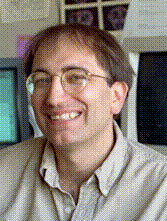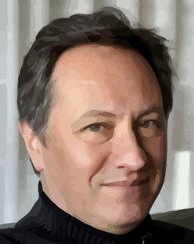Keynote Speaker
 Pat Hanrahan, professor at Stanford University, USA
Pat Hanrahan, professor at Stanford University, USA
Keynote Subject: Co-Specialization of Hardware and Software
Dahl-Nygaard Senior Prize Winner
 Oscar Nierstrasz, University of Bern, Switzerland, is the winner of the 2013 Dahl-Nygaard Senior Prize for his extensive and diverse contributions to research aimed at making systems more flexible with respect to changing requirements, based on programming languages and mechanisms supporting software evolution as well as tools and environments for reverse engineering and reengineering of complex software systems. On top of this, he also made valuable contributions to the research publication process, e.g., through "Identify the Champion", and to the new generations of researchers through top-level supervision.
Oscar Nierstrasz, University of Bern, Switzerland, is the winner of the 2013 Dahl-Nygaard Senior Prize for his extensive and diverse contributions to research aimed at making systems more flexible with respect to changing requirements, based on programming languages and mechanisms supporting software evolution as well as tools and environments for reverse engineering and reengineering of complex software systems. On top of this, he also made valuable contributions to the research publication process, e.g., through "Identify the Champion", and to the new generations of researchers through top-level supervision.
Oscar Nierstrasz was born in the Netherlands, but grew up in Ontario, Canada. He completed his B.Math at the University of Waterloo in 1979 and his M.Sc. in 1981 and his Ph.D. in 1984 at the University of Toronto, in the area of Office Information Systems. He worked at the FORTH Institute of Computer Science in Crete for one year (1985), and has lived since then in Switzerland. He was a member of the Object Systems Group at the Centre Universitaire d'Informatique of the University of Geneva, Switzerland (1985-1994) before coming to Bern. Prof. Nierstrasz has been active in the international object-oriented research community. He is Editor-in-Chief of the Journal of Object Technology, he has served on the programme committees of the ECOOP, OOPSLA, ESEC and many other conferences, and as the Programme Chair of ECOOP '93, ESEC/FSE '99 and MoDELS '06. He has served several times as president and vice-president of CHOOSE, the subgroup on object-oriented systems and environments of the Swiss Informatics Society. He has also served as Vice-President of AITO.
Keynote Subject: I Object, or How I Learned to Stop Worrying and Love OOP
Dahl-Nygaard Junior Prize Winner
 Matthew Parkinson, Microsoft Research Cambridge, UK, is the winner of the 2013 Dahl-Nygaard Junior Prize for his work on specifying and reasoning about object-oriented programs. He has introduced the notion of abstract predicates, providing a novel approach to longstanding problems in modular reasoning about object-oriented programs. He also argued that we should depart from the long-established class invariant concept, providing a novel approach which could conceivably impact the way that OO programming is understood in the future.
Matthew Parkinson, Microsoft Research Cambridge, UK, is the winner of the 2013 Dahl-Nygaard Junior Prize for his work on specifying and reasoning about object-oriented programs. He has introduced the notion of abstract predicates, providing a novel approach to longstanding problems in modular reasoning about object-oriented programs. He also argued that we should depart from the long-established class invariant concept, providing a novel approach which could conceivably impact the way that OO programming is understood in the future.
Matthew Parkinson is a Researcher at Microsoft Research Cambridge. He received his PhD degree from the University of Cambridge in UK in 2005, and went on to be a postdoctoral researcher at Middlesex University, and then a Royal Academy of Engineering Research Fellow at the University of Cambridge. He joined Microsoft in 2010. Matthew Parkinson has been a very active researcher in the area of program verification for both concurrent and object oriented programs. He has significantly extended the application domain of separation logic. His recent work has focussed on generalising separation logic with ideas from other concurrent methods such as rely-guarantee.
Keynote Subject: Views on Concurrency Verification
